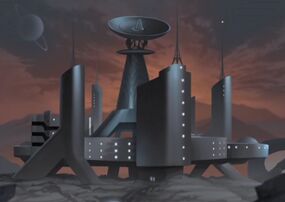Vulcan (planet)
It should be relocated at Vulcan (Invasion of the Daleks) because they're the same planet: both named Vulcan, both inhabited by humans, and both first mentioned in David Whitaker stories.
Talk about it here or check the revision history for additional comments.
- You may wish to consult
Vulcanfor other, similarly-named pages.
Vulcan was a planet which supported a human colony.
Overview
Vulcan was twelve parsecs away from any other colony. The planet was a young volcanic world with fertile soil and no native life. (PROSE: The Power of the Daleks)
The atmosphere was breathable by humans, with an oxygen density of 172, no radiation, and a temperature of 86 degrees Fahrenheit (30 degrees Celsius). Among the volcanic sand and ash were pools of fuming mercury. Vulcan's day was several hours shorter than Earth's. (TV: The Power of the Daleks)
History
Vulcan was first discovered in 1859. (AUDIO: The Pursuit of History)
Vulcan was colonised years before the Dalek invasion of Earth in the mid-22nd century, (PROSE: The Power of the Daleks) so that by 2136, Terri Willis told Ben Jackson Vulcan was "practically a legend." (PROSE: The Murder Game)
It was Earth's third ever colony, after humans discovered the mineral riches of the planet. The planet was owned and the mining operations were funded by the Interplanetary Mining Corporation. They sought to keep things "economical" by providing the colony with the bare necessities of technology and equipment, stifling efficiency and increasing danger on the planet. This built up resentment, and a band of rebels began plotting against Governor Hensell, whom they viewed as an IMC mouthpiece. (PROSE: The Power of the Daleks)
The colony was almost taken over by Daleks, who had been found in a crashed spacecraft underground and then reactivated by a scientist called Lesterson. This overlapped with the rebellion against Hensell led by Bragen. The rebellion failed after the Daleks began an indiscriminate slaughter of the colonists but the Second Doctor overloaded their temporary static circuit from the colony's electricity supply. This left the colony without power for months. Quinn became Governor in the aftermath. (TV: The Power of the Daleks)
The Daleks that survived this encounter with the Doctor were classified as insane and were sent to the "intensive care" section of the Dalek Asylum. These Daleks were later destroyed when the Dalek Parliament blew up the planet. (TV: Asylum of the Daleks)
The Seventh Doctor and Elizabeth Klein visited the mercury swamps of Vulcan prior to their arrival on the Vrill colony. (AUDIO: Survival of the Fittest)
Preparing for an uprising, the Yes Men servant robots on New Houston made Ben Jackson relive the Dalek attack on Vulcan repeatedly through a simulation until he found a way to win the fight. (AUDIO: The Yes Men)
Behind the scenes
- Scientists of the 19th and 20th centuries hypothesised the existence of a planet between the orbit of Mercury and Sol, and sometimes referred to that planet as Vulcan. This theory has since been discredited, but such a planet was shown in a chart of the solar system in Invasion of the Daleks, a comic story written in 1964 by Terry Nation and David Whitaker, while The Taking of Planet 5 would later make reference to the Solar System's Vulcan as a nonexistent planet. It is at any rate unclear if Whitaker, who later penned The Power of the Daleks, intended for both the Vulcans he had introduced to be the same location.
- The Star Trek character Spock came from the fictional planet Vulcan. If one discounts the mention of a planet Vulcan in Invasion of the Daleks, Star Trek only just beat Doctor Who in introducing the concept of an alien world called Vulcan by a few weeks, as it debuted not quite two months before The Power of the Daleks aired. Both shows seem to have selected the name independently.

